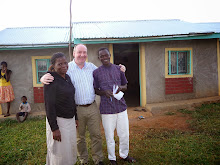“How many
do you think they will have done?” I asked Moses, as we rattled our way along
the bone shaking, pot holed road towards Kibos.
“About five”
Moses replied, “they can’t have done more, it is really hard work”
Moses and I
had gone to town to do some jobs and, amongst other things, to buy a large
water tank to site on our land close to the pump. The tank will be linked up to
irrigation pipes and provide a steady stream of vital nutrients to all of the
plants in the new greenhouse, which arrives tomorrow (African time**), along
with the water tank.
We had left
Ackworth Boys Brigade digging holes.
It seemed a
little unfair to be honest, setting off in the heat of the day back to town,
leaving the Ackworth group slaving away over a hot garden, but we have fifty
banana stems to get in and they are very particular about the conditions in
which they are planted.
Joseph, the
gardener at Kibos, carefully measured each hole that needed to be dug. 3 feet
wide by 3 feet long by 2.5 feet deep. It sounded easy. The 3 ft x 3 ft was
pretty straight forward, but the x 2.5ft down was to prove more than a little
challenging.
The banana stems
themselves are small little things, but the conditions they need have to be
precise or else the crop will not flourish. Once planted they send out suckers
sideways into the ground and in order for them to grow well the ground needs to
be soft and full of nutrients – too hard and the suckers will not be able to
feed the plant and the banana stems will be small. As a result, a suitable hole
needs to be dug, then the banana stems inserted, then the hole is filled in
with manure and fertiliser.
There are
many parallels between growing bananas and working with street children. Both
need space to be themselves, to push out when they need to and to find that
there is the support and the help they need to grow. If the conditions aren’t
right, then the fruit will not grow well, but when everything comes together
there is a wonderful harvest.
My day had
started early, as I had been invited to preach at the Nakumatt staff pre-work
worship. I was here on
Saturday with Moses and really enjoyed it and today we returned with a full
worship team.
We arrived
at the goods in entrance at 7:25 and went through the shutters to get set up.
Amps, microphones, keyboards and guitars in place Moses and the team led an
energising morning praise time as workers drifted in to the store. By 8:15 the
whole of goods in and the warehouse were clapping, singing and dancing.
Teaching here
is a challenge for a Methodist trained preacher used to a 20 minute slot on a
Sunday as I had 5 minutes to share something before the warehouse shutters were
opened and the lorries queuing patiently outside began unloading their
deliveries.
It will be
a surprise to many of my Wheatley Lane friends to learn that I managed a very
brief illustration of the power of God’s spirit in our lives before we were
warmly greeted by all of the staff as they made their way to their assigned
stations.
We shared
tea and bread with the store manager and reflected on what a difference it
makes to the performance of the store when the staff feel like a team and are
energised and happy before work begins.
We headed
back to St Anna’s to pick up the Ackworth team before setting off down the busy
roads to Kibos and their engagement with picks and shovels.
“I think
they might have done more than five” I said to Moses confidently, “possibly as
many as six”.
The skies
blackened overhead and spots of rain on the windscreen told of an impending
downpour. We weaved our way in between the matatus that gather on what remains
of the road through Kibos market. Once it was a reasonably smooth road, but now
it has become a jumble of holes, ruts and crevices, only negotiated with patience
and low gears.
We pulled
in through the blue metal gates guarding the entrance to our land as the rain
fell heavily onto the deep red earth, to find that the Ackworth team were
dispersed to the four corners of the field, taking shelter from the elements.
We waited a
moment and as the rain eased Moses, Pam and I walked down the land to where the
digging had begun with some enthusiasm a few hours earlier.
“It’s been
hard”, said Colin, echoing Moses thoughts to me, “but we have managed to do
twelve holes”.
Moses
looked shocked
“Oh, have
you really done twelve holes?” he said, with a hint of disbelief, “Let me see”
and he walked off to inspect them.
He looked
into each one carefully, inspecting the sides to make sure they were straight,
ready to receive a full allocation of bananas and mulch.
“That’s
really great” he said, looking up at the group, “I always knew you could do
it”.
** the calculation of “African time” is an
inexact science, but it is generally accepted that it lies somewhere between
one hour and three days after any specific time agreed between two parties for
the purposes of a meeting or a delivery.





No comments:
Post a Comment